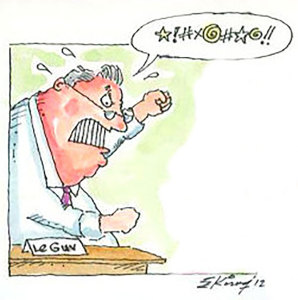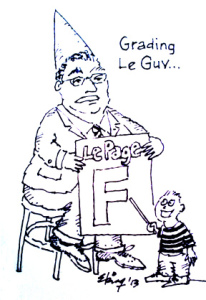
-Ed King ’12
Who knows why people vote the way they do. There are countless potential reasons for every ballot box decision. Patterns can be recognized. There are always surprises. But, your guess is as good as mine.
One candidate’s victory is never the fault of another. Candidates win because of their message, or their experience, character, leadership…
Still, LePage did not win by a majority. There will always be that nagging question: If Cutler had not run, where would the majority of voters have turned?
In Portland, when we elected Mayor Brennan, we made sure we did so with a majority vote.
In 2010, Portland adopted ranked-choice voting. Voters can rank mayoral candidates in order of preference. Each choice is a vote in a round, and the rounds are tallied instantly. It is also called instant runoff voting. The rounds are counted until one candidate wins a majority of the vote in that final round.
Imagine… In the gubernatorial race, eight percent of the voters pick Cutler as their first choice. This is their First Round choice. Next, all eight percent rank Michaud as their second-ranked choice. It is down to their third preference, but they find themselves sorely lacking in choices. They cannot stomach voting any more rounds, and cast their ballot. They have no vote in the following rounds.
The paper ballot is scanned. The rounds are instantly tabulated. All the first choices are counted, and the first round show LePage in the lead, but with less than fifty percent of the vote. Michaud trails by only five percent. Round two is instantly calculated, and with Cutler’s eight percent, Michaud wins the race.

-Ed King, ’13
Is it likely that the race would have gone that way? Cutler’s supporters might have mostly picked Michaud second, but would there have been enough votes in the second round for his victory? Maybe LePage would have garnered a majority in the second round. At least, we would know a lot more about the true intent of the electorate.
Portland candidates for Mayor (there were a lot of them) used this system to their advantage. They kept their campaigns clean, and mostly positive. They all wanted the other candidates’ supporters to like them second-most. It took a lot of rounds, but when the votes were tallied and verified, there was most definitely a clear winner.
It is a nice system. Maine should consider it.
-Tony Zeli, Editor & Publisher






Don’t Blame Cutler: Maine Should Follow Portland’s Lead
-Ed King ’12
Who knows why people vote the way they do. There are countless potential reasons for every ballot box decision. Patterns can be recognized. There are always surprises. But, your guess is as good as mine.
One candidate’s victory is never the fault of another. Candidates win because of their message, or their experience, character, leadership…
Still, LePage did not win by a majority. There will always be that nagging question: If Cutler had not run, where would the majority of voters have turned?
In Portland, when we elected Mayor Brennan, we made sure we did so with a majority vote.
In 2010, Portland adopted ranked-choice voting. Voters can rank mayoral candidates in order of preference. Each choice is a vote in a round, and the rounds are tallied instantly. It is also called instant runoff voting. The rounds are counted until one candidate wins a majority of the vote in that final round.
Imagine… In the gubernatorial race, eight percent of the voters pick Cutler as their first choice. This is their First Round choice. Next, all eight percent rank Michaud as their second-ranked choice. It is down to their third preference, but they find themselves sorely lacking in choices. They cannot stomach voting any more rounds, and cast their ballot. They have no vote in the following rounds.
The paper ballot is scanned. The rounds are instantly tabulated. All the first choices are counted, and the first round show LePage in the lead, but with less than fifty percent of the vote. Michaud trails by only five percent. Round two is instantly calculated, and with Cutler’s eight percent, Michaud wins the race.
-Ed King, ’13
Is it likely that the race would have gone that way? Cutler’s supporters might have mostly picked Michaud second, but would there have been enough votes in the second round for his victory? Maybe LePage would have garnered a majority in the second round. At least, we would know a lot more about the true intent of the electorate.
Portland candidates for Mayor (there were a lot of them) used this system to their advantage. They kept their campaigns clean, and mostly positive. They all wanted the other candidates’ supporters to like them second-most. It took a lot of rounds, but when the votes were tallied and verified, there was most definitely a clear winner.
It is a nice system. Maine should consider it.
-Tony Zeli, Editor & Publisher